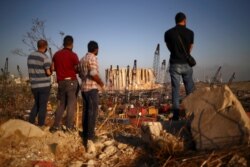Grain elevators damaged by the explosion that devastated the port of Beirut last year will have to be destroyed because they risk collapsing, according to a report released Monday.
The report was drawn up by the Swiss firm Amann Engineering, which provided assistance to the Lebanese authorities after the August 4, 2020, blast that devastated the port and part of the Lebanese capital, killing more than 200 people.
Experts from Amann Engineering laser-scanned the large, gutted block of silos that rises near the site of the explosion and found it to be "an unstable and shifting structure."
"Our recommendation is to proceed with the deconstruction of this block," the report said. "It is becoming more and more evident that the concrete pillars have been heavily damaged," the experts said, adding "new silos will have to be built at another location."
According to the Lebanese authorities, the explosion was caused by a shipment of ammonium nitrate, a product used as a fertilizer but also as an industrial explosive.
This stock of nitrate, seized on board a ship and stored in the port for years, caught fire, causing the gigantic explosion.
The silo block, an imposing structure 48 meters high, had a capacity of more than 100,000 tons.
Lebanese Economy Minister Raoul Nehme said in November that it should be destroyed, but authorities have yet to make a decision.
According to Amann Engineering's report, "there is no way to ensure safety even in the medium term if the north block (of the structure) remains as it is."
The damage to some of the silos was so severe that they are tilting dangerously.
"The incline is happening at the rate of 2 millimeters per day, which is a lot structurally speaking," the experts said.
By way of comparison, before being stabilized, the famous Leaning Tower of Pisa tilted at 5 millimeters per year.
The confirmation that the silos cannot be saved complicates an already critical situation in Lebanon in terms of food supply.
Lebanon is 85% dependent on imports in this area. It is also experiencing its most serious economic crisis in decades.





